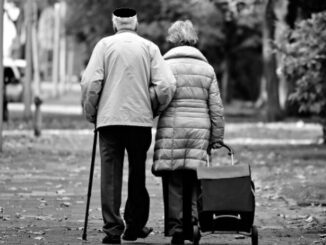
During a Shiva call, someone asked the following of Rabbi Ovadia Yosef; when comforting the people, why do we use the word Hamakom which refers to Hashem and also means the place rather than using the word Hashem. המקום ינחם אתכם בתוך שאר אבלי ציון וירושלים “May the Lord comfort you together with all mourners of Zion and Jerusalem.”
Rabbi Ovadia Yosef so beautifully explained that “Hamakom the place where the deceased is going to, THAT in of itself IS the comfort.”
They are now back at the place where the neshumah is at peace. They are in the divine presence and reunited with our forefathers, and all will reunite in the days of תחית המיתם (resurrection of the dead.)
A funeral should be a time when we celebrate the life and overall accomplishments of the deceased, as well as the fact the person is going to the world of truth, where they will reap the great reward for the Torah they learned and the mitzvahs they did.
My maternal grandmother used to say “for the person who passed on, for them, it is very good, as they are in a good place, but for those of us who stay behind, for us, it’s bitter.”
In order to help with the sadness of being left behind, we can send them “packages of goodies” by doing mitzvahs in their memory. This way we bring them honor and stay connected to them.
We know on Rosh Hashanah it says:
ספרי חיים וספרי מתים פתוחים לפני יושב על כסא הדין
The book of life and the book of death are opened before he who sits on the judge’s throne, meaning God himself.
Rabbi Ovadia Yosef asked why do we need two books? Have the book of life and either you make it into the book of life or not. If one is not in the book of life then that is it for them, why the need for two books?
Rabbi Ovadia Yosef explained that on Rosh Hashanah everyone who is alive is judged and everyone who passed away is also being judged on this day for their deeds. What is there to judge the deceased for every year anew? They can no longer do mitzvahs or Avairos out of free will?
The answer is that they are getting judged for the deeds being done by others in this world because of them.
All Torah learning and all mitzvot done in this world in their merit or because of them are getting credited back to them. Someone who taught Torah or created an organization that people still follow and benefit from, will get credit for all and reap the reward in the world to come, long after they died. The same is true if a person inspires others to sin or leaves a legacy that causes others to sin. All their sins will be credited to him and on Rosh Hashanah all these deeds are in front of Hashem.
This is inspiring and comforting, knowing that every time we do a mitzvah in the merit of the deceased, their soul is elevated to an even higher and better place in Gan Eden and reap reward.
Mourning and being depressed is not helping the deceased. Just the opposite. When you are besimcha, happy in life, accept Hashem’s will, and you keep doing better for yourself and focus on doing mitzvahs, this will help your loved one who passed on.
Why is it that many people are very scared of death, despite the fact that we all know it is inevitable?
It comes from people feeling that they are not living their lives to the fullest potential. It comes from people being ashamed to face Hashem when they feel they are not accomplishing or doing enough mitzvos in this world.
However, if we live the Torah way as the In Pirkei Avos מסכת אבות · פרק ב · משנה י –
שוב יום אחד לפני מיתתך one should repent the day before death, since we never know when that day will be, we should live every day as if it is our last day on earth. This way we start living a more focused and Torah life that we can be proud of and so the fear of death leaves us.
Living with this in mind should not be depressing in any way. Just the opposite. It helps us live a life of meaning and greatness. We never take anyone or anything for granted.
We appreciate and accept our family for who they are and cultivate great, loving and lasting relationships. Likewise, we don’t get upset so fast over things as we look at the bigger picture and purpose of life.
When something upsets or bothers you, think like this; if you look back in a week from now, will this issue still make you upset? If the answer is no, then let it go.
If the answer is yes, please make sure to take the time to work it out in your own heart and if needed when you are calm, rested and well-fed, discuss it nicely without accusation but for the sake of resolution with the other party. Don’t leave any open issues for the future, as the future may never come.
When we live with death in mind we are not afraid of death, meaning if we live a meaningful life and always looking for the next good deed we can do, we are no longer afraid of facing Hashem in the world to come.
Instead of spending your money and precious time in this world on stuff which we cannot take along to the next world, focus on buying mitzvos.
Example: on your birthday, instead of going out to eat or getting a gift, use the money to buy yourself an everlasting gift. Take the time to choose a person in need and pay their grocery bill, or find an organization you trust and is close to your heart. Have them help you learn more about how you can spend your money to assist in one of their programs.
The above can be a lot of fun, and it feels great to be a giver. Instead of feeling down that another year flew by, and you are a year older (a year closer to face your maker) you feel good that you bought yourself a great place in the next world where it all matters. This can help you face death easier, knowing that you have merits waiting for you to reap the reward.
I read several stories written by women who were afraid to discuss death even while their husbands were on their deathbed, and then they were left lots of questions and unresolved resentment.
Discussing the future at any age while healthy should not be scary. Knowing what your spouse would want for you, your children and for themselves after death gives you a sense of peace.
There are lots of anti-Semitic and terror attacks against Jews all around the world. Even in Monsey, New York, Chariedim were attacked inside and outside of shuls. Williamsburg New York chassidim were bitterly beaten in the streets and kids were deliberately being pushed, scooters taken away, or their hats pushed off their heads to scare them. Wigs pulled off women’s heads.
In Florida, New Jersey, and Pennsylvania (just to name a very few) Jews were killed just because they are Jews.
These incidents should wake us up to the reality that we don’t know when our last day on this earth is.
Here in Israel, people have been living with this reality for years, and yet, most are at peace with themselves and these facts of life.
At one point, when there was heightened tension with Arabs, we read an article about the importance of preparing a will. The author explained that one needs to protect their most precious possessions, the kids, if God forbid both parents die in an attack. By having a will, the courts will know who you want to be raising your children.
Making a will while healthy is said to be a sgulah for long life. When we spoke with a lawyer, he said that every time there is tension of war looming, many young people come into his office to write a will despite the fact that they don’t currently have many material possessions. Writing a will and discussing the future gives you peace and closure knowing that if your time comes, your loved ones know what you wanted.
At my funeral I want everyone to be happy as I am living the life beyond my dreams in the spiritual realm. Living in Israel walking distance from Hashem’s home, is the best life a person can have.
On Shabbos or Yom Tov, since we cannot walk to our parents’ home, we go to Hashem’s home to be in His presence at Har Habays. As of now, the Kosel is the closest we can get to Har Habays, where all blessings come down and then flow to the entire world. May we very soon be zocha to the rebuilding of the Bais Hamikdash so that Hashem has a home to dwell amongst us.
At my shiva, I want my family and friends to have a Kumzit along with a table filled with good food so whoever is paying a shiva call can make Bruchos (blessings) out loud in order for everyone in the room to say Umain and sanctify the name of Hashem.

